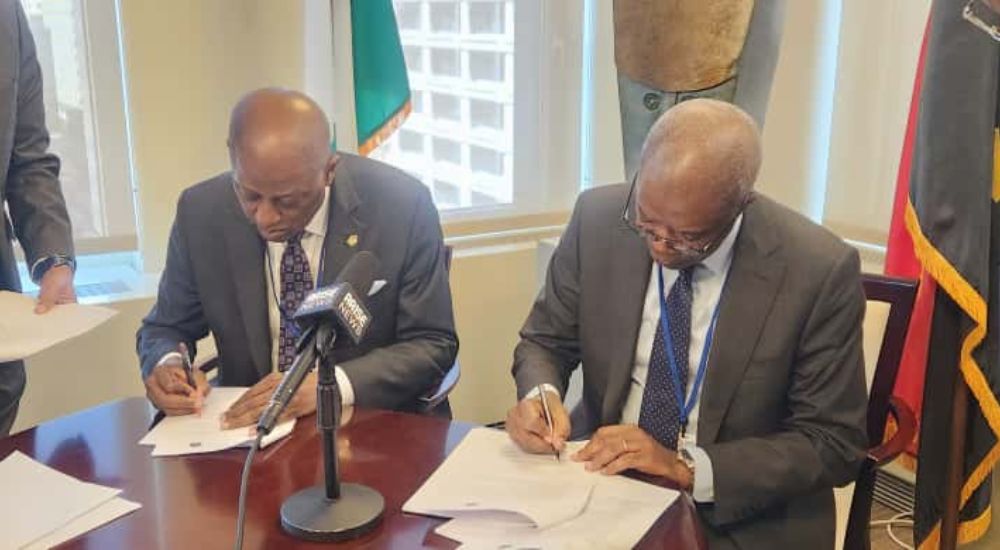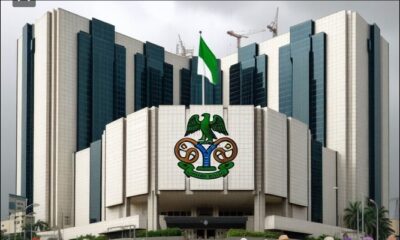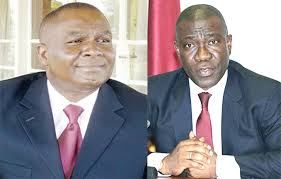Breaking News
CBN, Angola Central Bank Sign MoU to Strengthen Bilateral Cooperation

The Central Bank of Nigeria (CBN) and the Bank of Angola have signed a Memorandum of Understanding (MoU) aimed at strengthening bilateral cooperation, enhancing capacity building, and promoting knowledge sharing between both central banks.
The agreement was signed on Thursday on the sidelines of the ongoing International Monetary Fund (IMF) and World Bank Annual Meetings in Lima, Peru, by the CBN Governor, Olayemi Cardoso, and his Angolan counterpart, Manuel Antonio Tiago Dias.
Officials said the pact marked a new phase of collaboration between the two financial institutions and reflected a broader commitment to regional financial stability across Africa.
Speaking at the signing ceremony, which was moderated by the CBN Deputy Governor (Economic Policy), Mohammed Abdullahi, and attended by senior officials of both banks, Cardoso described the agreement as a “timely and significant milestone” in strengthening inter-African cooperation in central banking.
“This forum brings together a multiplicity of stakeholders and interests from across the globe, and what we’ve done today highlights the spirit of cooperation that defines these annual meetings,” Cardoso said.
He added that the agreement provides an opportunity to build a more interconnected and resilient African financial system capable of withstanding external shocks.
A statement issued by the apex bank on Friday noted that the collaboration aligns with Nigeria’s strategic goal of promoting regional stability, supporting cross-border financial integration, and enhancing institutional resilience within Africa’s monetary landscape.
Providing further insight into the framework, Abdullahi explained that the MoU establishes a structured platform for both central banks to exchange technical expertise, regulatory information, and supervisory best practices.
He said the agreement covers several key areas, including foreign reserve management, currency operations, monetary policy coordination, payment systems, and cybersecurity.
Other areas of focus include anti-money laundering and counter-terrorism financing, as well as staff training, financial statistics, and research capacity development.
“This cooperation will strengthen our collective ability to manage systemic risks, enhance transparency, and promote financial stability in our respective countries,” Abdullahi said.
He added that the framework would also enhance oversight of cross-border financial institutions, a growing necessity as African economies become more integrated through trade and financial services.
Angolan governor hails strategic partnership
In his remarks, the Governor of the Bank of Angola, Manuel Antonio Tiago Dias, welcomed the partnership, describing it as a strategic alliance that would help both nations deepen financial integration and institutional reform.
“Nigeria and Angola share similar macroeconomic aspirations, maintaining stability, fostering financial inclusion, and modernising our payment systems. This MoU allows us to work together toward these common goals,” he said.
Dias noted that the agreement also aligns with ongoing efforts by African central banks to strengthen intra-continental collaboration, in line with the objectives of the African Continental Free Trade Area (AfCFTA) and other regional economic integration initiatives.
Part of Tinubu’s Africa-focused economic diplomacy
The agreement comes at a time when African economies are intensifying coordination on monetary policy, digital payments, and anti-money laundering frameworks, amid rising regional financial flows and exposure to global economic shocks.
It also underscores Nigeria’s renewed diplomatic and economic outreach under the administration of President Bola Tinubu, whose agenda prioritises financial sector reforms, regional partnerships, and macroeconomic stability.
Under Cardoso’s leadership, the CBN has initiated a series of policy realignments aimed at restoring confidence in Nigeria’s foreign exchange market and strengthening regulatory oversight.
The latest collaboration with Angola, analysts say, forms part of a broader effort to promote Africa-led solutions to the continent’s financial challenges, especially in areas such as liquidity management, digital finance, and banking supervision.



























